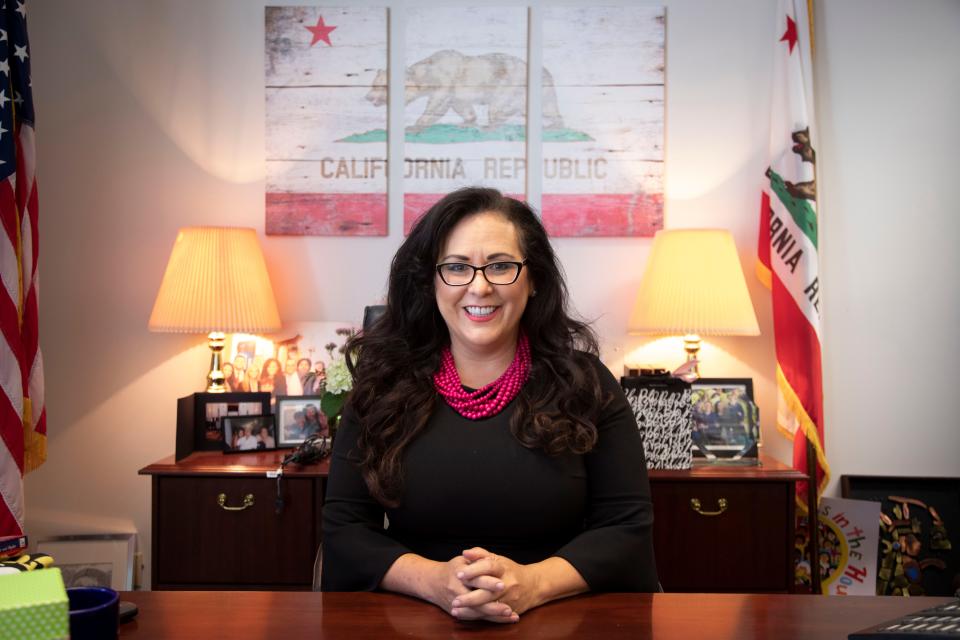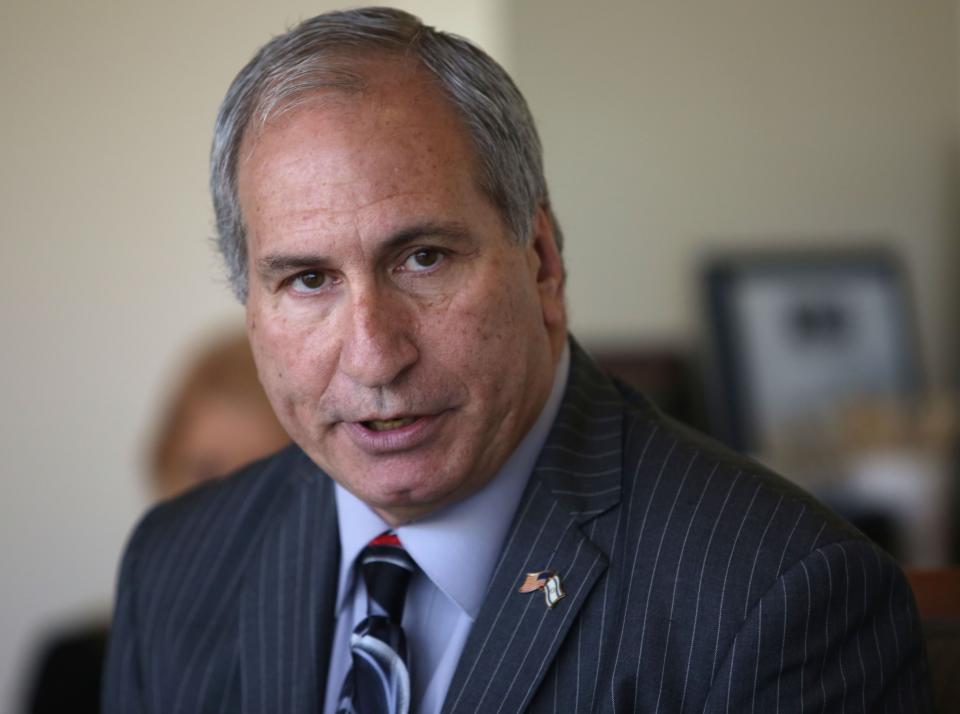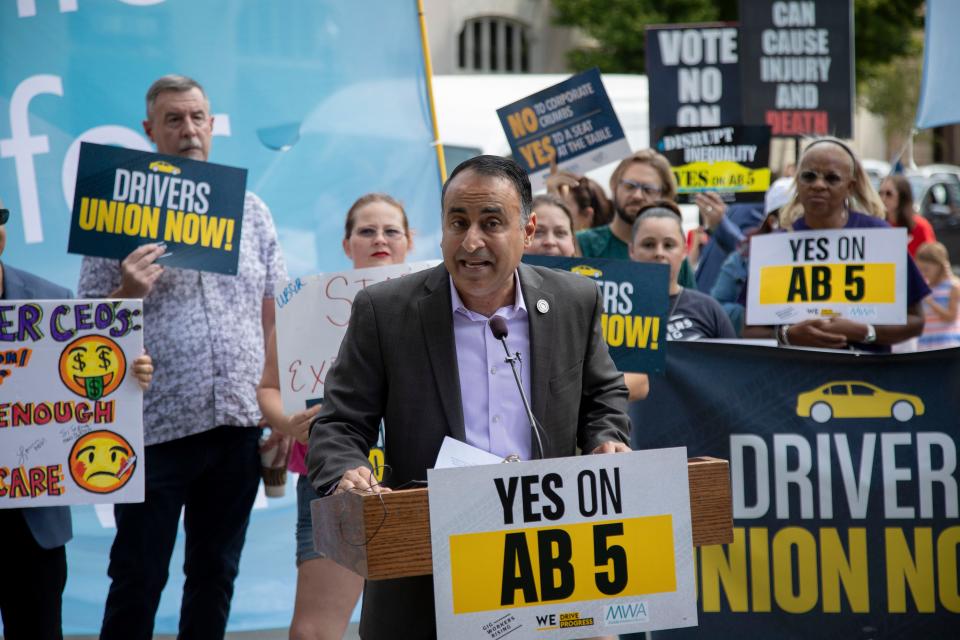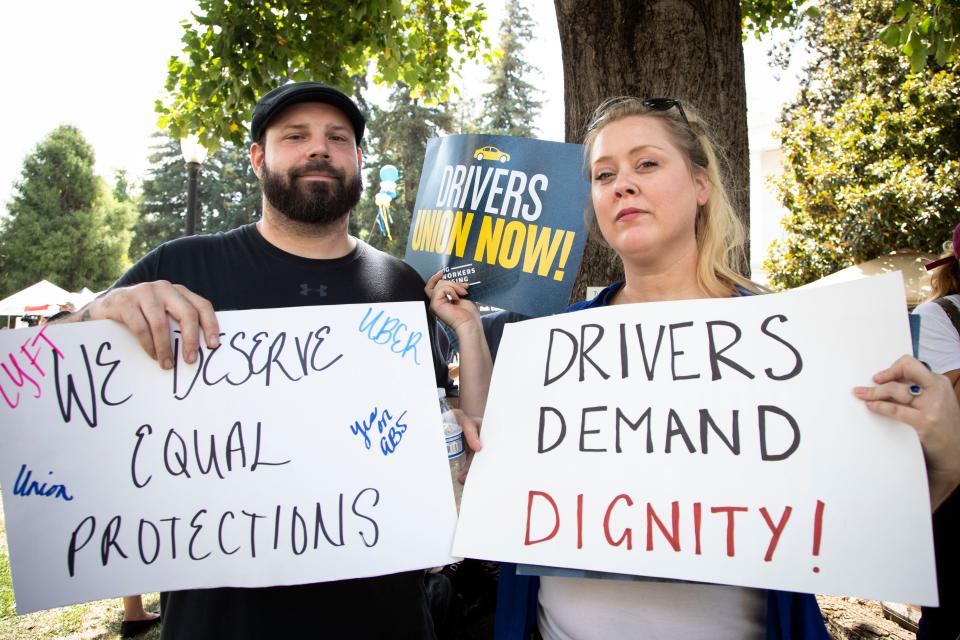California's Lorena Gonzalez: AB 5 champion and 'Black Widow of Public Policy'
The California Legislative session was barreling to a raucous finale.
Anti-vaccination protesters flooded the capitol building hollering their opposition to Senate Bill 276, a newly signed law that cracks down on exemptions. Singing janitors mixed through their ranks, demonstrating in support of Assembly Bill 547, which aims to combat sexual harassment in their field.
On some afternoons, Uber and Lyft rideshare drivers and gig-economy organizers joined the chorus as they circled the rotunda calling for lawmakers to pass the landmark labor bill, Assembly Bill 5.
The disparate issues that drew these passionate crowds had one thing in common: Assemblywoman Lorena Gonzalez's name was on all three buzzworthy bills — and hundreds of others introduced this session.
The Democrat who represents Southern San Diego authored 34 pieces of legislation, but for Gonzalez, that’s not exactly out of the ordinary. She's achieved big wins each year she has been in office. Her bills often start conversations in other states and set the bar for progressive policies around the country, especially when it comes to workers' rights.
Since she was elected in 2013, she put the state on the path to reach $15 an hour minimum wage by 2022, she ushered in requirements for public schools to test lead levels in drinking water and has authored new protections for an array of workers, including nail salon employees and NFL cheerleaders.
Just two years into her tenure in 2015, The Atlantic called her “the state’s most influential female politician” after she authored the first law that guaranteed paid sick days for all employees. The next year, she was number 35 on Politico’s list of 50 “thinkers, doers, and visionaries transforming American politics.”
The first Latina to chair the powerful Appropriations Committee, Gonzalez also heads the California Latino Legislative Caucus and serves on the Committees on Education, and Health, Water, Parks, and Wildlife, among others. She is hoping to add another "first" to her list of accomplishments as a contender for the 2022 race to become California's next Secretary of State. If she wins, she will be the first Latina elected to a statewide office.
A former labor leader who spent years as a single mom of two before marrying former Republican Assemblyman (now Democratic San Diego County Supervisor) Nathan Fletcher credits her organizing roots for her ability to trailblaze.
"I don’t think there is a day that goes by that I don’t think about working-class and middle-class workers — women, single moms in particular — folks who are just trying to get by," she says of her track record. "How do we make life better for them?"

From labor leader to lawmaker
The daughter of a Mexican immigrant, Gonzalez was raised primarily by her mother who worked as a nurse after her parents divorced when she was young. Growing up in San Diego County, she always had a passion for politics. She was introduced to the labor movement early on, as her close childhood friend was the daughter of local labor leader, Jerry Butkiewicz. Butkiewicz was largely responsible for bringing the area's AFL-CIO chapter to power, and Gonzalez would later follow in his footsteps.
After earning a bachelor’s degree from Stanford University, she received a master’s from Georgetown and a law degree from UCLA. Gonzalez had her first baby, daughter Tierra, as a first-year law student.
Her family has grown since. She married Fletcher in 2017 and now calls their big blended a family — complete with her two kids and his three — a "modern-day Brady Bunch."
These days her 23-year-old daughter lives on her own in LA, and she shares with a laugh that she is often surrounded by boys.
"My step-father lives with us as well as the three boys and my husband," she says adding that she grew up with two older brothers so she's used to it. "But I am still scrapping for everything, even in my own house."
Her family is not separated from her work, and she shares that her kids' experiences have inspired her to take action throughout her career. Tierra and her brother Antonio, who was born seven years after, would spend their formative years at their mother’s side, as she forged her way toward becoming a California change-maker.
Her dedication to the cause and a directness that plays out publicly on social media has earned her both fans and foes. From her years-long battle with actor Rob Schneider over his anti-vaccination stance to online exchanges with Uber executives, she has become as controversial as she is prolific. She's not one to shy away from a fight, especially when it comes to labor issues.
In the latest round, she's even embraced a derisive new nickname, initially issued as an insult: "The Black Widow of Public Policy."
'Black Widow of Public Policy'
During a tense debate over AB 5, pro-business Republican state Sen. Jeff Stone of La Quinta took the Senate floor for a long impassioned speech about his opposition. Rebuking pro-labor lawmakers, he referred mockingly to the "union caucus" he thought was backing the bill, and said that those who achieved exemptions "didn’t get caught in the labor union spider web spun by the black widow of public policy.”

Most observers, including legislators, reporters, and even protesters, believed the black widow he was referring to was Gonzalez, who raised a fist as the phrase was uttered.
Stone now says it was all a misunderstanding — that he was referring more broadly to labor unions and his perception of their influence on the legislature. Either way, Gonzalez embraced the moniker, even temporarily adding it to her Twitter handle.
"I think she took it as a badge of honor," Stone says. “If she self-identifies with the description that I had for the irritants of labor, then that’s fine with me."
She wasn't the only one who ran with the nickname. Her detractors have spread offensive depictions of the assemblywoman, including illustrations of her as the black widow spider. She has long been the target of vicious online personal attacks, fielding misogynistic, racist, and threatening remarks often shared on Twitter.
Just a note about fat-shaming (a favorite tactic currently used against me by the anti-vaccines community) ... I used to have serious food issues. Like here, where I was being sworn into the bar. I could fit into a girls size 12. So, yeah, go to hell. I like my curves. pic.twitter.com/9Sr85YzNLF
— Lorena (@LorenaSGonzalez) September 17, 2019
Before a protester threw a menstrual cup full of red liquid at the Senate floor on the last night of the session, activists against Senate Bill 276 spread doctored photos of a blood-covered Gonzalez inscribed with "the blood of innocents is on my hands."
Still, Gonzalez has surged forward. And agree or disagree with her mission, she is playing a major role in shaping the future of the most populated state in the union — and ultimately the nation.
"My number one focus is always on worker issues," she says. "It is a commitment I made to myself and what I was seeking in an elected official."
I’ve been so busy this week, I didn’t realize we were running out of bread. So, boys are getting luke-warm spaghetti in their lunches instead of sandwiches. They will either be thrilled or totally disgusted, and I have no idea which. #MinorMomFail
— Lorena (@LorenaSGonzalez) September 19, 2019
Though her first job out of law school was in Sacramento, working for California’s then-Lt. Gov. Cruz Bustamante, she says her political trajectory grew out of the labor movement. After moving back to San Diego from Sacramento, she took a job as a political director for the San Diego and Imperial counties Labor Council, AFL-CIO.
She would soon become the first woman elected to lead the powerful organization in San Diego, a role that helped shape her political priorities. Representation for labor was, after all, what drove her to seek a seat in the California Assembly.
“I wanted somebody who would wake up every single morning and say, what can I do today to help working people,” she said. "And then I thought, well, I know someone who would that — so I ran for office.”
But even in a state with a Democratic supermajority and strong support for progressive policies, her battles are hard-fought.
While she claimed victory in the passing of AB 5 she also had to swallow some defeat. Senate negotiations that secured the passage of the package forced Gonzalez to introduce an add-on bill to which she was vehemently opposed. Assembly Bill 170 granted newspaper publishers and distributors a one-year reprieve from the law for delivery people, a move Gonzalez says contradicted the bill's aim and intent.
In an emotional testimony against AB 170 — which ironically carried her name as author — she told her colleagues in the Assembly that she would not vote for it herself.
"That was hard," she says. "These are people of color, often women, with their kids, who at 3 or 4 in the morning are getting the papers delivered. It is a tough job and it is a job they perform every day of the year. To say that they don’t deserve the basics of minimum wage is a little tough."
In the late-night hours before the measure passed, she broke down in tears introducing the measure in the Labor and Employment Committee.
“All in all it was a huge year for Assemblymember Gonzalez and AB 5 was certainly a cornerstone of that,” said the committee's chair, Assemblymember Ash Kalra, a Democrat from San Jose. “Considering how much work Assemblymember Gonzalez put in, it was unfortunate that [AB 170] cast a small shadow on her overall victories.”

Kalra describes the move as “an unfortunate part of politics,” but added that there’s lots more work to be done to ensure California’s workers are protected.
Gonzalez agrees, sharing that she survives on the mantra that her job is to produce the most good for the most amount of people.
“I have been in positions before, where, unfortunately,” she stops for a long sigh, “there is justice delayed for a group of folks in order to get immediate justice for a lot of people. And it always deeply saddens me — but, we have to get things done.”
Despite the disappointment, Gonzalez was not short on wins this session and she’s now awaiting the governor’s signature on several game-changers. One of her favorite bills, Assembly Bill 773, passed with little fanfare.
The bill requires school districts to offer a course on how to vote. She thinks it will do a lot to get minority voters to the polls, especially for the children of immigrants and first-generation voters who didn't grow up watching their parents vote.
“We teach people how to drive, we teach people all the mechanics of everything else we do,” Gonzalez says. “It would make sense to me that we would start with [voting] when there are so many kids who don’t have that experience.”
Looking ahead: AB 5 still isn't settled
There's also the second year in the session to look forward to.
Among Gonzalez's top priorities come January will be a new plan to phase out single-use plastics. She teamed up with a long list of senators and assemblymembers to introduce companion bills, AB 1080 and SB 54, which would phase out 75% of plastic packaging by 2030.
State Sen. Nancy Skinner, a coauthor for SB 54 who represents cities across Contra Costa and Alameda counties, says the legislation is likely to gain support as the lawmakers work to answer concerns and questions from critics, especially those in the restaurant industries that rely on the products.
Gonzalez emphasizes that the environmentally focused bills are still tied to her priorities to protect constituents. "The breakdown of the environment affects the breakdown in working-class and middle-class families the most," she says. “I try to ensure we have a browner, working-class perspective on it, and make sure it is not a white, coastal issue."
There’s also more work to be done on AB 5.
"A lot of that work is left to the labor movement," Gonzalez says, adding that she has to remind herself that it isn't her job to ensure workers who want unions are represented and organized.

Negotiations will also continue, as legislators work with industries to figure out how to implement the complicated bill. Gonzalez is already preparing for battle, especially against tech titans Uber and Lyft, which have teamed up with other gig-economy companies to fund a ballot initiative to take down the new law.
Uber officials have already come out swinging, saying they don’t plan to change their workers' classifications either way. She told reporters that Tony West, the company's legal counsel who made the statement, is "full of s---t." She intends to ensure the gig economy changes its ways.
“AB 5 was a huge victory, but in many ways it is just beginning,” Kalra says, adding that he thinks Gonzalez is sometimes underestimated.
“As time goes on, I think we are going to look back and really marvel at what a year she had, and the heavy lifts she was able to accomplish,” he said. “I for one will be very proud to say that I had a front-row seat to watching her do her magic.”
This article originally appeared on USA TODAY: California's Lorena Gonzalez: AB 5 champion, 'Black Widow of Public Policy'

